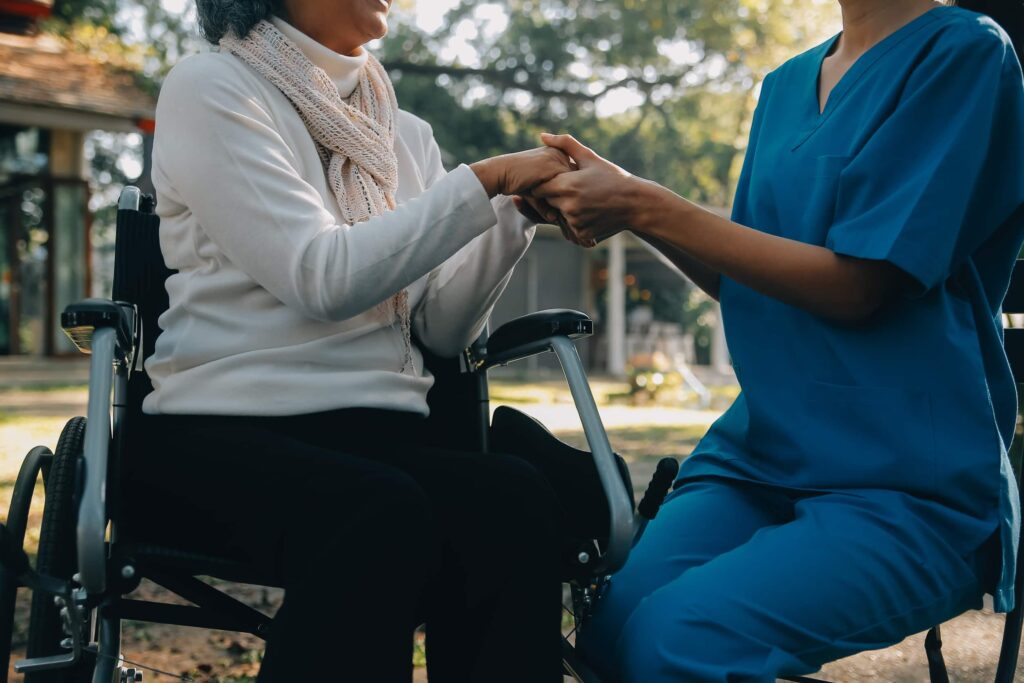As you explore the role of a Personal Care Aide, you’ll uncover how essential they are in supporting individuals with daily living activities. By managing personal hygiene, meal preparation, and medication adherence, aides guarantee clients maintain a sense of independence. Their ability to communicate effectively and demonstrate empathy fosters strong relationships, enhancing emotional well-being. You’ll soon discover how these skilled professionals navigate challenges and impact quality of life considerably.
The Essential Duties of Personal Care Aides
Personal care aides play an important role in maintaining the well-being and daily functioning of those they assist. You’ll find that their responsibilities are extensive, making certain that every aspect of personal care is addressed. They manage personal hygiene and personal grooming, crucial for maintaining dignity and health. Meal preparation is another key duty, as it guarantees nutritional needs are met. Medication management requires precision to prevent adverse health effects. Aides also provide mobility assistance, enhancing independence. Companionship services combat loneliness and improve mental health. Safety monitoring and transportation services make sure your loved ones are secure and mobile. Daily routines are maintained through light housekeeping, contributing to a clean and organized living environment. Each task is essential in promoting a high quality of life.
Skills and Qualities of Successful Personal Care Aides

Beyond their extensive duties, personal care aides possess a distinct set of skills and qualities that enable them to execute their responsibilities effectively. Your ability to manage time efficiently guarantees that all tasks from medication reminders to meal preparations are completed punctually. Effective time management is essential; it minimizes stress and enhances client satisfaction. Additionally, problem-solving skills are vital. You must assess and adapt to unexpected situations swiftly, such as sudden changes in a client’s health status. Evidence suggests that effective problem-solving reduces errors and improves care outcomes. Being detail-oriented and having strong organizational skills further contribute to successful care provision. These competencies not only optimize daily operations but also support the physical and emotional well-being of those you assist.
Building Strong Relationships With Clients
To build strong relationships with your clients, you need to employ effective communication techniques such as active listening and clear articulation. Establishing trust and reliability is essential, and you can achieve this by consistently meeting your clients’ needs and being punctual. Providing emotional support through empathy and responsiveness not only enhances client satisfaction but also fosters a sense of security.
Effective Communication Techniques
Although effective communication is often overlooked, it serves as the cornerstone of building strong relationships with clients in personal care settings. To excel, you must master active listening, which involves fully concentrating, understanding, responding, and remembering what your client says. This technique fosters trust and guarantees that you’re attuned to their needs. Equally important, nonverbal cues such as eye contact, facial expressions, and body language greatly impact the interaction’s quality. Research indicates that nonverbal communication constitutes up to 93% of message interpretation, highlighting its critical role. By combining active listening with keen observation of nonverbal cues, you’ll enhance client rapport and satisfaction. This approach not only improves service quality but also empowers clients, fostering a supportive and collaborative environment.
Trust and Reliability Factors
Building trust and demonstrating reliability are fundamental in establishing strong relationships with clients in personal care settings. Trust building starts with consistent, punctual service delivery and maintaining confidentiality, as these elements form the foundation of a dependable rapport. Conduct a reliability assessment by evaluating your adherence to scheduled tasks and the accuracy of your service. Evidence suggests that clients are more likely to express satisfaction when their aides display reliability and transparency. Regular feedback sessions are beneficial for gauging reliability and adjusting services as needed. Additionally, documenting care routines and ensuring clients’ needs are consistently met further solidifies trust. Ultimately, by prioritizing trust building and reliability, you enhance client satisfaction and foster a sustainable caregiving relationship.
Emotional Support Strategies
When providing personal care services, offering emotional support is essential for developing strong client relationships. Implement emotional resilience strategies by recognizing stressors and promoting coping mechanisms. Supportive listening techniques enhance communication, fostering trust and empathy. Share encouraging feedback and validate feelings to reinforce positive interactions.
| Strategy | Description | Outcome |
| Emotional Resilience | Identify stressors and develop coping strategies | Increased client stability |
| Supportive Listening | Actively listen and validate client’s feelings | Strengthened trust |
| Encouraging Feedback | Provide positive reinforcement and acknowledgment | Enhanced emotional connection |
| Empathy Development | Understand and share client emotions | Fostered interpersonal bonds |
| Validation Techniques | Confirm client’s experiences and emotions | Improved client satisfaction |
These techniques facilitate emotional rapport, essential for holistic care. By applying these methods, you guarantee a supportive environment that prioritizes client well-being.
The Emotional Impact of Personal Care Work

As a personal care aide, you often form emotional connections with your clients, which can enhance care quality but also increase emotional labor. Research indicates that emotional labor challenges include managing personal feelings while maintaining a professional demeanor. Implementing evidence-based coping strategies, such as mindfulness and peer support, can help mitigate emotional stress and improve job satisfaction.
Emotional Connection With Clients
Empathy plays an essential role in the emotional connection between personal care aides and their clients. You build trust through active client engagement, fostering a supportive environment. Emotional resilience is vital, as it helps you maintain professionalism while maneuvering complex emotions. Evidence shows that strong emotional bonds improve client well-being and satisfaction.
| Aspect | Benefit | Evidence |
| Empathy | Builds trust | Increases client satisfaction |
| Client Engagement | Enhances emotional bonds | Promotes well-being |
| Emotional Resilience | Maintains professionalism | Supports complex interactions |
Maintaining these connections requires skill and dedication. You need to balance empathy with emotional resilience, ensuring consistent care quality. This approach not only enhances your effectiveness but also enriches the client’s daily life, creating a more fulfilling experience for both parties involved.
Challenges in Emotional Labor
Although personal care work is deeply rewarding, it poses significant challenges related to emotional labor. Managing emotional boundaries is essential to maintaining professional effectiveness. Without them, you risk developing compassion fatigue, a state of emotional exhaustion that reduces your ability to empathize with clients. Research indicates that setting clear emotional boundaries can mitigate these issues. Here are key points to contemplate:
- Understand Emotional Triggers: Identify situations that evoke strong emotions.
- Set Professional Limits: Clearly define what is within your professional scope.
- Regular Self-Check: Frequently assess your emotional state to guarantee balance.
- Seek Peer Support: Collaboration with colleagues can provide emotional relief.
- Prioritize Self-care: Engage in activities that rejuvenate your emotional health.
Coping With Emotional Stress
When dealing with the emotional stress of personal care work, it is vital to recognize the psychological toll this profession can take. You face daily challenges that require effective stress management strategies. Research shows that personal care aides often experience burnout, anxiety, and depression due to the demanding nature of their roles. Developing emotional resilience is important. Techniques like mindfulness and cognitive-behavioral strategies can enhance your ability to cope with stressors. Prioritize self-care activities, such as regular exercise and adequate sleep, to maintain mental health. Evidence suggests that building a supportive network of colleagues and supervisors is beneficial. Engage in training programs that focus on emotional intelligence to further bolster your resilience. By adopting these methods, you can manage emotional stress effectively.
Navigating Challenges in the Personal Care Field
Steering challenges in the personal care field requires a strategic approach, as this sector demands a high level of adaptability and resilience. You need to focus on client independence, utilizing adaptive techniques to enhance their daily living skills. It’s essential to assess each client’s unique needs and adjust your methods accordingly. Evidence suggests that personalized care plans greatly improve outcomes.
Here are some strategies:
- Promote Self-Sufficiency: Encourage clients to perform tasks independently, boosting their confidence.
- Use Adaptive Tools: Implement equipment like grab bars or adaptive utensils to facilitate independence.
- Stay Informed: Keep up with the latest research and best practices in personal care.
- Prioritize Safety: Confirm environments are safe, reducing fall risks.
- Continuous Training: Regularly update your skills to meet the evolving demands of care.
The Importance of Communication and Empathy
Effective communication and empathy are essential components in delivering quality personal care. As a personal care aide, you must engage in active listening to understand the needs and preferences of those you assist. This involves not just hearing words but also interpreting non-verbal cues, ensuring you fully grasp the context and emotions involved. Research indicates that when aides practice active listening, care recipients report higher satisfaction levels.
Moreover, providing compassionate responses is vital. These responses validate the individual’s feelings and foster a supportive environment. Evidence shows that empathy in care settings can lead to improved well-being and reduced anxiety for clients. By consistently applying these communication strategies, you enhance trust and cooperation, ultimately contributing to a more effective caregiving experience.
Training and Certifications for Personal Care Aides
Although the role of a personal care aide may seem straightforward, acquiring the right training and certifications is vital for delivering competent care. You must understand certification requirements, which vary by state, and can include a high school diploma, completion of a formal training program, and passing a competency exam. Training programs often cover essential topics like basic healthcare, nutrition, and personal hygiene. Evidence-based training guarantees that you’re equipped to handle daily challenges efficiently.
- Understand state-specific certification requirements
- Complete a formal training program focusing on healthcare essentials
- Pass a competency exam to demonstrate your skills
- Engage in continuous education to stay updated with best practices
- Acquire specialized certifications for advanced care scenarios
These steps guarantee you’re well-prepared for your role.
The Future of the Personal Care Aide Profession

As the healthcare landscape evolves, the role of personal care aides is set to expand considerably. With technology advancements, you’ll find new tools enhancing your efficiency and client care. For example, wearable health monitors and AI-powered apps are being integrated into daily routines, allowing real-time health tracking and personalized care plans. These changes create career opportunities, offering you pathways into specialized areas or management roles. Embracing technology could differentiate you in this growing field.
| Technology Advancements | Career Opportunities | Impact on Care |
| Wearable Health Monitors | Specialized Training | Real-time Health Data |
| AI-powered Apps | Management Roles | Personalized Care |
| Telehealth Integration | Expanded Job Market | Remote Consultations |
These innovations guarantee personal care aides remain essential in healthcare delivery.
Frequently Asked Questions
What Are the Typical Working Hours for a Personal Care Aide?
You’re likely to find shift flexibility in this role, with typical schedules ranging from part-time to full-time hours. Evidence shows personal care aides often work mornings, evenings, or weekends, ensuring coverage for clients’ diverse needs.
How Do Personal Care Aides Manage Their Own Physical Health?
You manage your physical health by using self care strategies like regular exercise, balanced nutrition, and adequate rest. Evidence shows these methods effectively maintain physical wellness, reduce stress, and prevent burnout, enhancing overall job performance.
Are Personal Care Aides Allowed to Administer Medication?
You can administer medication as a personal care aide if you’ve completed the required caregiver training. This training guarantees you understand proper medication administration procedures, dosage guidelines, and potential side effects, following state regulations and employer policies.
What Is the Salary Range for Personal Care Aides?
You’re wondering about a personal care aide’s salary range. It typically varies between $20,000 and $30,000 annually. Salary factors include experience and education, while regional differences greatly impact earnings, with urban areas generally offering higher pay.
Can Personal Care Aides Provide Support for Mental Health Needs?
Yes, you can rely on personal care aides for emotional support and promoting mental wellness. While they’re not therapists, they assist clients by offering companionship, encouraging activities, and monitoring changes in emotional or behavioral patterns.
Conclusion
In understanding the role of a Personal Care Aide, you recognize their impact on enhancing clients’ quality of life through daily assistance and companionship. With training and empathy, you build trust and promote independence, essential for client satisfaction. Evidence shows that effective communication skills are important, as they help navigate challenges and foster emotional well-being. As the demand for personal care grows, your role will continue evolving, ensuring clients receive the best support possible in their daily routines. Healing Hearts Medical Home Health Care can help by offering experienced, compassionate personal care aides who are dedicated to meeting each client’s unique needs, promoting both physical comfort and emotional connection in every interaction.

